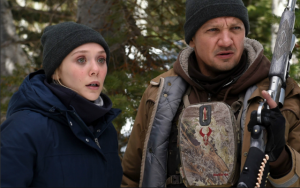Metro Canada: Screenwriter Taylor Sheridan explores “Wind River.”
 By Richard Crouse – Metro Canada
By Richard Crouse – Metro Canada
Last year Taylor Sheridan helped breathe new life into the western genre with the script to Hell or High Water. It was a hot and sweaty West Texas crime drama that earned four Oscar nominations. Before that he penned Sicario, the Emily Blunt, Benicio del Toro drama about an idealistic FBI agent working with an elite task force to stem the flow of drugs between Mexico and the US.
His latest film, this time as both writer and director, is another neo-western but feels much different. “Wind River” is a wintry murder mystery set on a First Nations Reserve.
“They are each exploration of the modern American frontier,” he says, “a real examination of the exploitation of these areas. [They are also about] fathers managing grief and moving on or overcoming and accepting perceived failures as fathers. I had become a new father when I wrote these and obviously was terrified of the notion of failing my child. So what does a writer do? He imagines the worst scenario and writes about it.”
In the film Jeremy Renner plays Cory Lambert, a Wyoming Fish and Wildlife agent called to a reserve to track a mountain lion that has attacked local livestock. While hunting his prey he discovers the dead body of local teen. She’s miles away from the nearest house, barefoot and frozen solid. Lambert figures she died running away from something or someone until her lungs froze and burst in the 20 below weather. When FBI agent Jane Banner, played by Elizabeth Olsen, arrives the pair soon discover that mountain lions aren’t the most dangerous predators in the area.
Wind River, like his other films, explores social issues. Sicario dove into the soft underbelly of the American war on drugs while Hell or High Water was a financial-crisis drama set against a backdrop of outlaws, buddies and banks. Wind River shines a light on law enforcement’s apathy in investigating the disappearance of indigenous women. All are, as he says, “examinations of grief,” a topic he admits isn’t exactly the stuff of summer blockbusters.
“Obviously the studio system is trying to figure out what most people want to watch and make a movie that appeals to most people,” he says. “I’m not trying to do that. I’m trying to write a film that I want to go see. I assume I am not that unique about things that matter to me. That’s what I do. I can’t go into the writing of a screenplay with concerns about the audience I’m trying to reach or the expense or difficulty of making them. When I am struck with something I care about and I’m curious about the way a character might deal with this issue or that issue, then I explore. I have no regard for who is going to come see it and I can’t.”
Sheridan, who, when he isn’t directing or writing, is also a busy actor, most recently starring on the hit show Sons of Anarchy, says making Wind River was difficult but he’s happy with the film.
“The ultimate goal is to do what you set out to do,” he says, “which is make a movie that excites and entertains and has you thinking about it later. That is the Holy Grail of filmmaking. If I can do that, I’ve done my job.”
